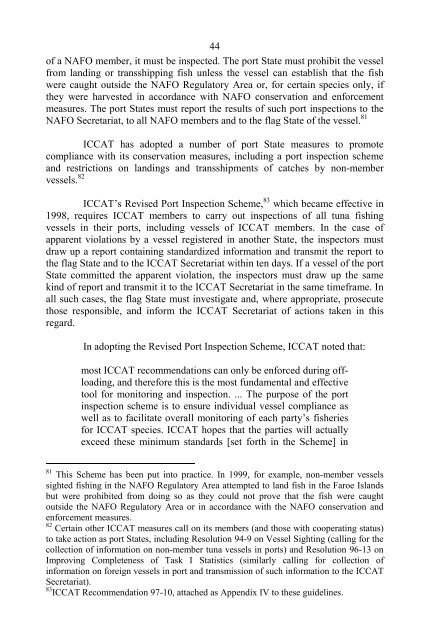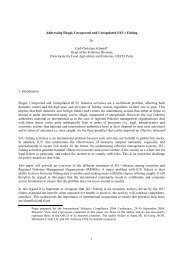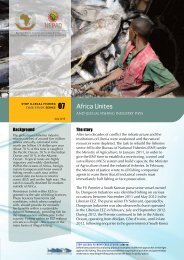Implementation of IPOA/IUU - International MCS Network
Implementation of IPOA/IUU - International MCS Network
Implementation of IPOA/IUU - International MCS Network
You also want an ePaper? Increase the reach of your titles
YUMPU automatically turns print PDFs into web optimized ePapers that Google loves.
44<strong>of</strong> a NAFO member, it must be inspected. The port State must prohibit the vesselfrom landing or transshipping fish unless the vessel can establish that the fishwere caught outside the NAFO Regulatory Area or, for certain species only, ifthey were harvested in accordance with NAFO conservation and enforcementmeasures. The port States must report the results <strong>of</strong> such port inspections to theNAFO Secretariat, to all NAFO members and to the flag State <strong>of</strong> the vessel. 81ICCAT has adopted a number <strong>of</strong> port State measures to promotecompliance with its conservation measures, including a port inspection schemeand restrictions on landings and transshipments <strong>of</strong> catches by non-membervessels. 82 ICCAT’s Revised Port Inspection Scheme, 83 which became effective in1998, requires ICCAT members to carry out inspections <strong>of</strong> all tuna fishingvessels in their ports, including vessels <strong>of</strong> ICCAT members. In the case <strong>of</strong>apparent violations by a vessel registered in another State, the inspectors mustdraw up a report containing standardized information and transmit the report tothe flag State and to the ICCAT Secretariat within ten days. If a vessel <strong>of</strong> the portState committed the apparent violation, the inspectors must draw up the samekind <strong>of</strong> report and transmit it to the ICCAT Secretariat in the same timeframe. Inall such cases, the flag State must investigate and, where appropriate, prosecutethose responsible, and inform the ICCAT Secretariat <strong>of</strong> actions taken in thisregard.In adopting the Revised Port Inspection Scheme, ICCAT noted that:most ICCAT recommendations can only be enforced during <strong>of</strong>floading,and therefore this is the most fundamental and effectivetool for monitoring and inspection. ... The purpose <strong>of</strong> the portinspection scheme is to ensure individual vessel compliance aswell as to facilitate overall monitoring <strong>of</strong> each party’s fisheriesfor ICCAT species. ICCAT hopes that the parties will actuallyexceed these minimum standards [set forth in the Scheme] in81 This Scheme has been put into practice. In 1999, for example, non-member vesselssighted fishing in the NAFO Regulatory Area attempted to land fish in the Faroe Islandsbut were prohibited from doing so as they could not prove that the fish were caughtoutside the NAFO Regulatory Area or in accordance with the NAFO conservation andenforcement measures.82 Certain other ICCAT measures call on its members (and those with cooperating status)to take action as port States, including Resolution 94-9 on Vessel Sighting (calling for thecollection <strong>of</strong> information on non-member tuna vessels in ports) and Resolution 96-13 onImproving Completeness <strong>of</strong> Task I Statistics (similarly calling for collection <strong>of</strong>information on foreign vessels in port and transmission <strong>of</strong> such information to the ICCATSecretariat).83 ICCAT Recommendation 97-10, attached as Appendix IV to these guidelines.
















